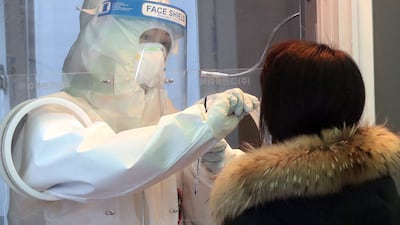For the past two weeks Fawzi Kesserwany and his friends have been handling phone calls from distressed Covid-19 patients scrambling for medical supplies amid a surge in Covid-19 cases.
The engineer co-founded a small activist group called Defend Your Rights that received 100 calls in a week when it launched an oximeter-sharing initiative at the end of January.
The devices are used by Covid-19 patients to monitor oxygen levels.
Although he is not a medical professional, Mr Kesserwany says he feels compelled to help.
"We couldn't just stand idle and watch as people died," he tells The National. "In the absence of the state, we had to act."
Mr Kesserwany is among hundreds of volunteers helping Lebanese to access coronavirus medication and equipment, which have become scarce and expensive.
Lebanon's health sector is struggling to cope with an increase in cases after restrictions were lifted for the holiday season in December. Despite a 25-day lockdown, the total number of Covid-19 deaths has almost doubled in one month, from 1,630 on January 1 to 3,145 by February 1.
________________
Coronavirus around the world
________________
Activists say the government has failed to respond to the crisis, leaving many patients to rely on friends and non-government orgnisations for medical supplies.
In Lebanon's sectarian system, religious communities traditionally turn to sect leaders, who head the country’s main political parties, for financial aid. This clientelist system also extends to medical support.
Mr Kesserwany says his group, born out of the mass anti-government protests movement of October 2019, seeks to break this cycle of dependence.
“The idea is to help people while promoting a culture of sharing,” he says. “We do not have to rely on sectarian political parties for necessities, we can rely on one another.”
Maroun Karam, co-founder of the NGO Baytna Baytak, says his organisation is helping Covid-19 patients because “we cannot rely on the government” to fulfil this role.
Baytna Baytak launched a fundraiser to buy 200 oxygen machines for Covid-19 patients, a target they managed to reach on Wednesday.
The Lebanese Red Cross also launched a hotline for the equipment, warning last week that it had only a “limited number of oxygen machines available”.
Oxygen machines can be used from home, so making them more accessible can help to free hospital beds for more severe cases of Covid-19.
“We are seeing our family and friends struggle to get hospital beds as the health sector is overwhelmed,” Mr Karam says.
His group has been receiving as many as 250 calls a day from patients seeking oxygen machines.
"There is a lack of machines and retailers are increasing prices because demand is rising. They are selling a machine that is worth $400 for $1,400," he told The National.
Many Lebanese and residents cannot afford to pay for such costly equipment.
For more than a year, Lebanon has been struck by a severe economic crisis, triggered in part by decades of corruption and a shortage of foreign currency. Officially pegged at 1,515 to the US dollar, the Lebanese pound is trading at more than 8,800 on the black market.
Imported in dollars, medical supplies and drugs are subsidised to keep prices affordable but high demand and shortages have fuelled a black market.
Mr Kesserwany says he paid 70,000 Lebanese pounds for an oximeter ($8 at the black market rate) when he was infected with the coronavirus in November. When Covid-19 cases peaked mid-January, a shortage of oximeters saw their price more than triple, the activist said.
"We allowed importers to get these machines, and these products are subsidised, yet they are selling them at high prices. That is unacceptable," a Ministry of Health official told The National.
Cash-strapped authorities have been unable to clamp down on these practices, but activists say they have had low expectations of their government for years.
The country has been run by a caretaker government since last August. Prime Minister Hassan Diab and his Cabinet resigned after a devastating explosion at the Beirut port tore through the capital, killing more than 200 people and wounding at least 6,500.
Sectarian disputes over ministerial portfolios have delayed the formation of a new government for the past six months, even as the country reels from the effects of the blast, the economic crisis and the coronavirus pandemic.
“People have lost all faith in the state. They ask NGOs directly for help because they know we are more effective,” says Jossie Jaalouk of NGO Lebanon for Tomorrow.
Lebanon for Tomorrow and the Georges N Khoriaty Foundation launched a Covid-19 kit for needy families last week. It contains basic medication such as paracetamol and vitamins, which many can no longer afford.
Activists and some volunteers say they have found strength in helping one another, but that change is desperately needed.
“We are here to help one another mentally and physically,” says Mr Karam of Baytna Baytak.
“But after the pandemic change must come. We must revolt against this political class. We must change the country.”












